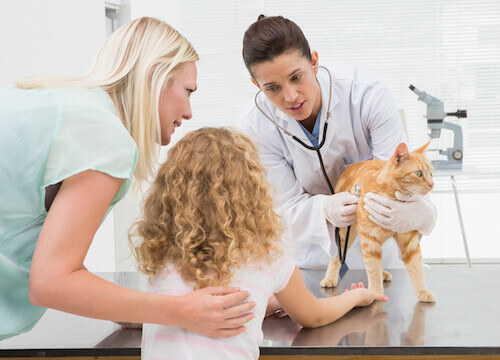Ear Infection | Worms | Fleas and Ticks | Cold | Pink Eye | Diarrhea | Vaccinations
What Should I Do If My Kitten Has an Ear Infection?
Kitten ear infections are a common occurrence if routine cleaning is not performed. The moist environment and hair in a kitten’s ears serve as a great place for bacteria, mites, and fungi to grow. Ears should be checked often for any signs of infection, as well as any dirt and debris that may need to be gently cleaned out.
When checking the kitten’s ears, thick and dark wax may be a sign of infection. Other symptoms of infections include a red and inflamed inner ear, ear discharge that may have a strong odor, frequent scratching of the ear, and shaking and tilting of the head. Severe infections may result in deafness and neurological damage, so it is important to treat the kitten promptly. Because there are various causes of an ear infection, contact a veterinarian to diagnose the cause and prescribe the proper treatment.
Treatments commonly include oral antibiotics or drops that must be put in the ear, and it is important to use the treatment according to direction from the veterinarian to ensure a full recovery. For severe infections, sedation and thorough cleaning at the veterinary office may be necessary. Use caution when administering treatments to the ear as to not damage the eardrum, and conduct routine cleaning after the kitten has recovered to prevent infections in the future.
How to Treat a Kitten that Has Worms
Cats who spend a lot of time outdoors are more prone to contracting worms, but many cats, indoors or outdoors, may be infected with worms and show no sign of an infestation. However, if gone untreated for a long period of time, infestations can cause serious health problems that can be fatal to the kitten. Worms are usually contracted through contact with the fecal matter of infected cats or may be passed to a kitten when nursing. Some parasitic worms in cats can affect humans as well, so treatment should be taken care of as soon as possible.
Tapeworms, hookworms, and roundworms are the most commonly seen types of worms in cats. If infected, the kitten may show symptoms that include vomiting, diarrhea, and bloody stools, weight loss, and bloating of the abdominal area. Worms may be visible in the fecal matter of the cat or around its rear end, so it is a good practice to check occasionally for these signs.
To treat worms, visit a veterinarian who will prescribe a treatment based on the type of parasite. There are over-the-counter treatments, but these may harm the cat if not used properly and may only kill one type of worm. Because many cats have worms, routine worming should be done as a preventative measure to avoid severe infestations, even if the cat shows no signs of having worms.
Further Reading:
Newborn Kitten CareKitty Owners’ GuidePopular Cat BreedsIs My Cat Sick?How to Tell If a Cat Is Pregnant
Preventing and Dealing with Fleas and Ticks
Fleas are very common on cats and can cause illnesses and discomfort, along with a frustrating problem to deal with at home. Because of their prevalence, cats and kittens should be treated routinely with flea control products, such as flea collars, repellents, and topical solutions, to prevent fleas. Symptoms of flea infestations include excessive itching and visible fleas and flea dust, but sicknesses may occur if diseases are transmitted from the feeding flea to the cat.
If an infestation occurs, talk to a veterinarian first to get advice, then purchase a flea treatment accordingly. There are many over-the-counter solutions, from powders and sprays to drops and shampoos. Treat the entire home and any pets consistently, as flea infestations may take a few months to be eradicated.
Ticks are a less common issue than fleas, but they can cause extreme illness if not taken care of as quickly as possible. A tick infestation may cause itching and skin irritation, and severe cases may cause anemia and various tick-related diseases. As with fleas, similar tick control products can be used year-round to prevent ticks from attaching to the kitten.
If a tick is found on a kitten’s skin, use tweezers or a tick remover to clench the tick close to the skin and pull gently outward to remove it. It is recommended to use latex gloves during removal. Avoid crushing or aggressively twisting the tick because infectious fluids and parts of the tick’s head may be left on the cat’s skin. Put the tick in rubbing alcohol to dispose of it, and clean the bite wound with a disinfecting wipe.
I Think My Kitten Has a Cold – How Do I Treat It?
Cold-like symptoms commonly occur in kittens as a result of an upper respiratory infection that is caused by the feline herpesvirus and calicivirus. URIs are often seen in cats who are kept in large numbers or when they are stressed over long periods, and they can be fatal if not addressed promptly. The risk of contracting these viruses can be reduced through vaccination.
Symptoms of a URI range from runny eyes and nose, sneezing and coughing to more severe symptoms that include loss of appetite, leading to anorexia, as well as sores on the tongue, mouth, and nose. If these symptoms are seen, call a veterinarian who will diagnose and prescribe treatment. Typical treatments involve injections and topical solutions, but severe cases may require further treatment and hospitalization. Although feline calici and herpes are viral, antibiotics are also regularly given to combat bacterial infections that often occur with URIs.
Along with medication, treatment at home is also important in helping a kitten’s condition improve when they have a URI. Keep the kitten warm and dry, and gently blot any discharge from the kitten’s eyes and nose with a damp cloth to prevent buildup. The throat may be irritated and inflamed, so offer the kitten soft, warm foods and plenty of water to keep it hydrated.
Can a Kitten Get Pink Eye?
Pink eye, or conjunctivitis, is very common in young kittens and can be caused by a range of things, including allergies, bacterial infections from feline chlamydia, or viral infections from feline herpesvirus or calicivirus. These various causes result in symptoms such as frequent blinking, squinting, eye discharge, red and inflamed skin around the eye, and frequent rubbing of the eye.
Serious cases of pink eye may cause blindness if untreated and may also be a sign of a larger underlying problem, so it is best to contact a veterinarian upon noticing these symptoms. A veterinarian will often examine the eye and take a culture to determine the cause and prescribe the proper medication.
Some cases that are less severe or are caused by allergies will heal on their own. In cases that require treatment, the medicine may include ointments, drops, oral medications, and antibiotics, and recovery generally occurs in less than a week. When caused by a virus, occasional symptoms may resurface for the remainder of the cat’s life but can be better managed by removing stressors and items that irritate the eyes.
What Is Causing a Kitten to Have Diarrhea?
Diarrhea in kittens may be caused for a variety of reasons and can be fatal, so it is essential to treat and diagnose the situation immediately upon noticing runny stools. Reasons for diarrhea may be dietary because a kitten’s digestive tract is not fully developed, making it very sensitive to changes in the type and amount of food given. Causes may also be due to ingestion of toxic materials or an allergy to the food being provided. More severe cases may be a result of infections that may come from bacteria, viruses, or parasites.
Symptoms that may accompany diarrhea are extreme dehydration, bloody stools, vomiting, lethargy, loss of appetite, and weight loss. Because diarrhea can be caused by a large variety of factors, give the veterinary office a call to help diagnose and solve the issue and determine if a visit is necessary. If diarrhea continues for over 24 hours or the kitten shows severe symptoms and pain, see a veterinarian immediately.
When treating the kitten at home, feed the kitten only bland meals for the next 24 to 48 hours, such as poached unseasoned chicken. Ensure that the kitten stays hydrated, offering water often by a syringe or pipette if the kitten is not willing to drink on its own. There are formulas that can be used to replenish electrolytes as well.
When Should a Kitten Get Vaccinated and What Vaccinations Should it Get?
Certain vaccinations are critical to ensure that a kitten doesn’t contract any preventable illnesses or transfer them to other cats while promoting overall health and the longer life of the cat. The core vaccinations that are recommended for all cats are distemper/panleukopenia, viral rhinotracheitis, calicivirus and herpes virus, and rabies. There are other non-core vaccinations that may be recommended based on the cat breed, whether it lives indoors or outdoors and geographical location.
Initial vaccinations are typically administered starting when the kitten is six to seven weeks old and may be offered as late as 20 weeks of age, depending on the vaccine. Check with a veterinarian to schedule vaccinations, as each case is dependent on the specific cat. Boosters for adult cats are administered by the discretion of the owner and veterinarian when the cat is full-grown, generally beginning a year after the kitten vaccinations have been given.




This article is a compassionate and comprehensive guide on diagnosing and treating a sick kitten, providing an invaluable resource for cat owners facing the delicate task of caring for an unwell feline friend. The level of detail, combined with a clear and accessible writing style, reflects the author’s dedication to empowering pet owners with the knowledge needed to navigate their kitten’s health challenges.